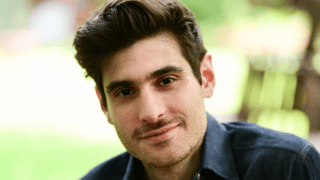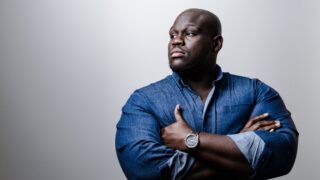The Lavin Agency Speakers Bureau
A speakers bureau that represents the best original thinkers,
writers, and doers for speaking engagements.
A speakers bureau that represents the best original thinkers,
writers, and doers for speaking engagements.
We can now grow a piece of human "brain" in a petri dish. Here's what that means for disease, ethics, and our brains' full potential.
One in five Americans lives with a brain disease like Alzheimer’s or schizophrenia. These diseases are the hardest to cure, with the lowest success rate for new treatments, because we’ve never been able to properly study the human brain—until now. Award-winning scientist Dr. Sergiu P. Pasca is breaking new ground in how we understand and fix the human brain. By turning skin cells into stem cells and then into brain cells, he’s pioneered a new way to study our brains’ wiring more accurately and in-depth than ever before. Sergiu’s work offers us a radical step forward in our ability to fight disease, decrease suffering, and unlock the full potential of the human brain—and he’s just getting started. “By recreating circuits of the human brain, we will gain new insights into human biology,” he says. “And this in itself will open a new era in the treatment of brain disorders.”
Sergiu P. Pasca, MD is the Kenneth T. Norris, Jr. Endowed Professor of Psychiatry and Behavioral Sciences at Stanford University and the Uytengsu Family Founding Director of Stanford Brain Organogenesis. He is a CZI Ben Barres Investigator and a Chan Zuckerberg BioHub Investigator.
Sergiu is a cutting-edge researcher on the rules governing human brain assembly and the mechanisms of disease. His independent laboratory at Stanford has made revolutionary breakthroughs, transforming skin cells into multipurpose stem cells, and then into brain cells. These clumps of cells, known as “organoids,” resemble those found in the cerebral cortex—the most “human” part of our brains. He then combined several organoids to create “assembloids,” a pioneering modular platform that allows him to study how neural circuits develop and function. These cellular models have helped him gain revolutionary insights and develop new therapeutic approaches for human physiology, evolution, and disease.
Sergiu has also organized major international conferences, led group efforts with leaders in this new research area, and extensively supported hundreds of labs worldwide in implementing these techniques through courses. For his groundbreaking work, he’s been named a Knight of the Order of Merit, a Doctor Honoris Causa, and a New York Times Visionary in Medicine and Science. He has given a TED mainstage talk, was a NYSCF Robertson Investigator, and was featured as a physician-scientist by Nature Medicine.
During his clinical training in Romania, he used biochemistry and genetics to explore gene-environment interactions in autism and schizophrenia. He continued his neuroscience training at the Max Planck Institute for Brain Research in Frankfurt where he investigated the role of gamma oscillations in visual processing. Interested in studying the biology of disease in human neurons, he pursued postdoctoral studies in Ricardo Dolmetsch’s laboratory at Stanford University, where he developed some of the first cellular models with induced pluripotent stem cells to study neuropsychiatric disorders.
He is the recipient of the Vilcek Award for Creative Biomedical Promise (2018), the National Institute of Mental Health BRAINS Award (2015), the MQ Award for Transforming Mental Health (2014), the A.E. Bennett Award in Biological Psychiatry (2018), the Folch-Pi Neurochemistry Award (2017), the Günter Blobel Award for Cell Biology (2018), the Daniel E. Efron Award in Neuropsychopharmacology (2018), a Breakthrough in Life Sciences Prize (2020) from Falling Walls, the International Basic Science Schizophrenia Prize (2021), the Joseph Altman Award in Developmental Neuroscience (2021), the Theodore Reich Award (2021), the Judson Daland Prize from the American Philosophical Society (2021), the 13th IBRO-Kemali Neuroscience Award (2022), the CINP Sumitomo/Sunovion Award (2023), the ISSCR Momentum Award (2024), and the Chica and Heinz Schaller Foundation Award in Translational Neuroscience (2024).
Sergiu was a fantastic speaker and a great storyteller. He made a technical topic very approachable and interesting for a non-scientific audience. He was very personable and engaged with our group on a variety of topics. Everyone loved his presentation!
Family Office in Wisconsin
Author, A Brief History of Intelligence AI Entrepreneur and Founder of Bluecore Forbes 30 Under 30 Honoree
CEO of Phylagen, Inc. TED Senior Fellow
Evolutionary Biologist Author Founder of Tangled Bank Studios Executive Producer of Oscar-Nominated and Emmy-Winning Documentaries

Author, A Brief History of Intelligence AI Entrepreneur and Founder of Bluecore Forbes 30 Under 30 Honoree
Cognitive neuroscientist Host of PBS Nova's Your Brain
Author of The End of Bias Award-winning science and culture journalist

Author, We Refuse to Forget and BLACK MOSES Contributing Writer, The New York Times Magazine Associate Professor, Northeastern University

Associate Professor of Business Economics and Public Policy at Wharton 2024 "Top 40 Under 40" Business Professor Author, Femonomics (Forthcoming)

Author, A Brief History of Intelligence AI Entrepreneur and Founder of Bluecore Forbes 30 Under 30 Honoree

Author of Grit, the #1 New York Times Bestseller | Pioneering Researcher on Grit, Perseverance, and the Science of Success

2024 Nobel Prize Winner | 3rd Most Cited Economist in the World | MIT Institute Professor | Bestselling Co-Author of Why Nations Fail and Power and Progress

Pulitzer Prize-Winning Creator of The 1619 Project | Executive Producer of the Emmy Award-Winning 1619 Project Hulu Docuseries | MacArthur Genius
Nike's Former Chief Marketing Officer | Author of Emotion by Design
CEO of The Atlantic | Former Editor-in-Chief of WIRED

The human brain’s ability to form parts of itself is one of the most miraculous things, says Sergiu P. Pasca, founding director of Stanford Brain Organogenesis. And it’s this very ability that has helped him pioneer a radical new technique to create miniaturized nervous system circuits, which helps us understand our brains and brings us closer to healing brain diseases.
In this mind-blowing talk, Sergiu delves into the captivating process of how the human brain assembles itself in an effort to demystify what makes us unique, and to uncover the biological origin of brain disorders through cutting-edge technologies developed by his Stanford lab. To recreate brain development in a dish, he developed self-organizing clumps of neural tissue known as “organoids” and “assembloids,” which his team has meticulously grown to form functional circuits. He shares his life’s pursuit to unravel the brain’s construction and its vulnerability to disease, demonstrating how these miniaturized nervous system preparations are pivotal in understanding the human brain. Audiences will walk away awed and inspired by the exploration of the frontier science that’s inching us closer to developing effective therapeutics for devastating disorders of the brain.